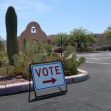On October 16, 2020, Michigan Secretary of State Jocelyn Benson ordered that all open-carry firearms were to be prohibited at polling places across the state. The action led an alliance of gun-rights groups to file suit and request a preliminary injunction against the order on October 22. Oral arguments were heard in the Michigan Court of Claims on October 27, on which date Judge Christopher Murray granted the injunction.
The directive banning firearms was short and to the point. It based itself on the premise that open-carry firearms in polling places “may cause disruption, fear, or intimidation for voters, election workers, and others present” in order to inhibit “the full and free exercise of the right to vote.”
Very simple. And one can readily see that it was objectionable to a portion of the population.
The court’s granting of the preliminary injunction was based on a point of law rather than the political buttons the directive pushed. The preliminary injunction for which the plaintiffs were suing would, in effect, overrule the Secretary of State’s directive prior to a full trial. Michigan precedent establishes three litmus tests for the issuance of the “extraordinary remedy” of such an injunction. These three tests are: (1) will irreparable harm be caused to plaintiffs were the injunction not granted?; (2) would public harm result from the injunction?, and (3) is it likely that the party seeking the injunction will prevail when the case comes to trial?
Judge Murray’s analysis of the question rests on these three tests, and, most particularly, the last of them. A large part of the plaintiffs’ case rested on their contention that the Secretary of State’s directive concerning firearms at polling places constituted a “rule” under Michigan’s Administrative Procedures Act. That 1969 law establishes the means “to provide for the effect, processing, promulgation, publication, and inspection of state agency rules.” It’s a complex multi-stage process that most certainly did not take place when the no-firearm policy was summarily issued a scant two weeks before the election. Given this argument’s obvious merits, Judge Murray wrote that the plaintiffs’ suit was likely to prevail.
In addition, the court’s ruling accepts that irreparable harm would indeed be suffered by the plaintiffs if the injunction was not granted. Although Michigan law prohibits the open carry of firearms in such places as hospitals and places of worship, the law nonetheless allows for firearms to be carried in some places. Therefore “to allow an unlawful directive to displace a valid statutory provision would irreparably harm those that the statute benefits, here plaintiffs.” As for the question of public harm, the court’s ruling points out that there are already statutes prohibiting voter intimidation and intimidation with a firearm. The public is therefore amply protected even without the Secretary of State’s directive. The court, therefore, ruled to issue the injunction.
Judge Murray’s opinion is quick to state that it is not a commentary on the Second Amendment and that the court’s job is “not to act as an overseer of the Department of State, nor is it to impose its view on the wisdom of openly carrying firearms at polling places.” In other words “the court’s constitutional role is properly limited to only declaring what the law is, not what it should be.” By making this clear, Judge Murray handily sidestepped the political issues that very likely underlay the case.
Partisan politics in Michigan have become so overheated this year that a plot was even hatched for the kidnapping of the state’s Democratic governor. Given that, and the fact that the Republicans have long considered themselves the guardians of the Second Amendment, one can strongly suspect that the Secretary of State’s directive was intended to provoke the political opposition. The result was the court case under discussion here.
One should mention that Judge Murray is officially nonpartisan, although he was reappointed to the Court of Claims by a conservative-majority Michigan Supreme Court in 2019. Before jumping to the conclusion that he automatically took the conservative side in the open carry debate, note should be taken of the fact that he is the same judge who rejected a petition against Governor Gretchen Whitmer’s stay-at-home order in April of this year. Although one cannot judge a judge on the basis of two rulings, that evidence does suggest that Judge Murray is living up to his nonpartisan alignment.
One would be hard-pressed to assess the effect on the vote tallies of both the directive and the injunction. Carrying firearms was permitted in polling places, but statistics were not collected as to how many people actually did so. Michigan was a hotly contested battleground state in the election, and its 16 electoral votes eventually went to Joe Biden by a margin of fewer than 150,000 votes. If the directive was indeed based on politics rather than objective concerns for voter safety, its implied concern was that Second-Amendment activists would overrun the state’s polling places, brandishing firearms to intimidate Democrats into voting for Donald Trump (or keep them from voting for Joe Biden). Biden’s victory in Michigan shows that, if there was such voter intimidation, it was not effective, and that, in hindsight, the Secretary of State’s directive was unnecessary. In our divided country, however, reasonable necessity has long ceased to be a characteristic of the political process.






